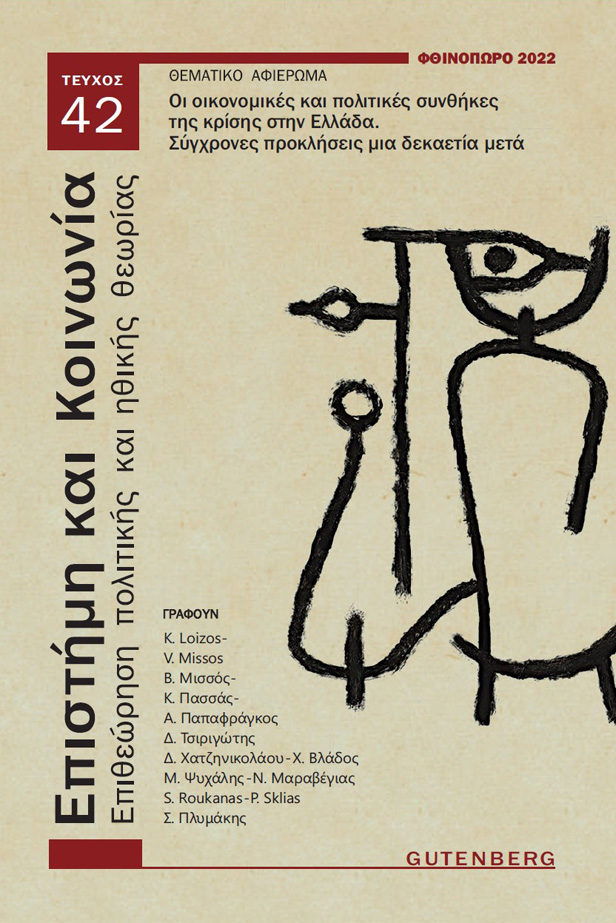The political economy of global inequalities under the prism of COVID-19 pandemic

Δημοσιευμένα:
Δεκ 5, 2022
Λέξεις-κλειδιά:
Political economy Inequalities 2 COVID-19 pandemic
Περίληψη
The manifestation of the COVID-19 pandemic created unprecedented conditions at the global economic level. Ten years after the manifestation of the global financial crisis of 2007-2009, the world economy is facing the most severe economic crisis since the end of World War II. The traditional tools of monetary and fiscal policy need to face the new challenge of confronting the implications of an economic crisis that is coming from the health sector and not from an economic sector. The combined economic effects of the global financial crisis of 2007-2009 with the severe economic impact of the COVID-19 pandemic create new challenges for the economic policy that is implemented by governments and central banks. The aim of this article is to reveal the political economy of global inequalities under the prism of the COVID-19 pandemic. Developing economies are faced with more severe economic challenges in comparison to developed economies. Economic and social inequalities are going to affect the economic prospects of developing economies in the long term.
Λεπτομέρειες άρθρου
- Πώς να δημιουργήσετε Αναφορές
-
Roukanas, S., & Sklias, P. (2022). The political economy of global inequalities under the prism of COVID-19 pandemic. Επιστήμη και Κοινωνία: Επιθεώρηση Πολιτικής και Ηθικής Θεωρίας, 42, 175–201. ανακτήθηκε από https://ejournals.epublishing.ekt.gr/index.php/sas/article/view/29176
- Ενότητα
- Άρθρα

Αυτή η εργασία είναι αδειοδοτημένη υπό το CC Αναφορά Δημιουργού – Μη Εμπορική Χρήση – Παρόμοια Διανομή 4.0.
Οι Συγγραφείς που δημοσιεύουν εργασίες τους σε αυτό το περιοδικό συμφωνούν στους παρακάτω όρους:- Οι Συγγραφείς διατηρούν τα Πνευματικά Δικαιώματα και χορηγούν στο περιοδικό το δικαίωμα της πρώτης δημοσίευσης ενώ ταυτόχρονα τα πνευματικά δικαιώματα της εργασίας προστατεύονται σύμφωνα με την άδεια Creative Commons Αναφορά Δημιουργού - Μη Εμπορική Χρήση - Παρόμοια Διανομή 4.0 Διεθνές , που επιτρέπει σε τρίτους - αποδέκτες της άδειας να χρησιμοποιούν την εργασία όχι για εμπορικούς σκοπούς, με την προϋπόθεση της διατήρησης των διατυπώσεων που προβλέπονται στην άδεια σχετικά με την αναφορά στον αρχικό δημιουργό και την αρχική δημοσίευση σε αυτό το περιοδικό και με διανομή τυχόν τροποποιήσεων υπό την ίδια άδεια όπως και το πρωτότυπο.
- Οι Συγγραφείς μπορούν να συνάπτουν ξεχωριστές, και πρόσθετες συμβάσεις και συμφωνίες για την μη αποκλειστική διανομή της εργασίας όπως δημοσιεύτηκε στο περιοδικό αυτό (π.χ. κατάθεση σε ένα ακαδημαϊκό καταθετήριο ή δημοσίευση σε ένα βιβλίο), με την προϋπόθεση της αναγνώρισης και την αναφοράς της πρώτης δημοσίευσης σε αυτό το περιοδικό.
- Το περιοδικό επιτρέπει και ενθαρρύνει τους Συγγραφείς να καταθέτουν τις εργασίες τους μέσω διαδικτύου (π.χ. σε ένα ακαδημαϊκό καταθετήριο ή στους προσωπικές τους ιστοσελίδες) πριν και μετά από τις διαδικασίες της δημοσίευσης, καθώς αυτό μπορεί να οδηγήσει σε παραγωγική ανταλλαγή ιδεών και σκέψεων καθώς επίσης και σε γρηγορότερη και μεγαλύτερη χρήση και ευρετηρίαση της δημοσιευμένης εργασίας (See The Effect of Open Access).
Λήψεις
Τα δεδομένα λήψης δεν είναι ακόμη διαθέσιμα.


